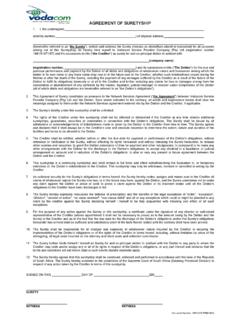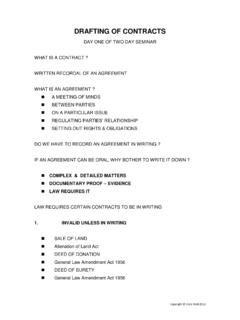Transcription of JUDGMENT - justice.gov.za
1 THE SUPREME COURT OF APPEAL. REPUBLIC OF SOUTH AFRICA. JUDGMENT . Reportable Case No: 176/2006. In the matter between CECIL NURSE (PTY) LTD Appellant and BONGILE NKOLA Respondent CORAM: SCOTT, VAN HEERDEN et MAYA JJA. HEARD: 15 NOVEMBER 2007. DELIVERED: 28 NOVEMBER 2007. SUMMARY: Contract clause requiring alterations to a suretyship agreement to be agreed to in writing by the creditor' to be binding whether creditor precluded from relying on terms of suretyship agreement presented to it by surety duly executed but subsequently alleged by surety to have been presented by mistake. Neutral Citation: This JUDGMENT may be referred to as Cecil Nurse (Pty) Ltd v Nkola [2007] SCA 154 (RSA). MAYA JA: 2. MAYA JA: [1] This is an appeal against a JUDGMENT of the Port Elizabeth High Court (Chetty J, Jansen J concurring) upholding the respondent's appeal against a JUDGMENT of the Magistrate's Court, East London. In that JUDGMENT the magistrate granted the appellant's claim against the respondent for payment of a debt arising from a sale of goods.
2 The appeal is with the leave of the court below. [2] The appellant is a manufacturer and supplier of office furniture and equipment and trades from its two branches in Port Elizabeth and East London. The respondent is the sole director and shareholder of FMMC. Holdings (Pty) Ltd ( FMMC'), a supplier of school and office furniture and equipment based in Mthatha. [3] FMMC, duly represented by the respondent, started purchasing goods for resale from the appellant on a cash-on-delivery basis in April 2000. In the early stages of the parties' dealings, FMMC would refer its customers to the appellant's East London branch to view the goods. However, a need for a showroom in Mthatha soon became apparent as demand grew for these commodities. The respondent then approached the appellant's branch manager in East London, Mr Bob Lindsay, with a proposal that the appellant itself establish the showroom. Lindsay, in turn, referred him to the appellant's managing director, Mr Robbie Bergh, in Port Elizabeth.
3 Bergh was not amenable to the proposal, which he considered risky, as he believed that a branch in Mthatha would be too far to monitor. 3. [4] It was ultimately agreed between the respondent, Bergh and Lindsay that FMMC would establish its own showroom with the appellant's assistance. The requisite showroom stock would cost approximately R50 000. As FMMC did not have the necessary funds it was agreed that the appellant would grant it a credit facility of approximately R50 000 for which the respondent would stand surety. On 18 August 2000 the appellant's staff in East London sent by facsimile a credit application form and a deed of suretyship to FMMC for completion. Both documents, duly executed by the respondent, were returned by facsimile to the appellant's East London branch at 10h04 on 23 August 2007. On the same day Lindsay faxed a letter to FMMC which read: RE: Office furniture for showroom We wish to confirm that your order as per items discussed for your showroom totalling R48 402-75 excluding VAT, will be discounted further to nett amount of R40 000 excluding VAT as a once off consideration for your new showroom.
4 Payment details: R20 000 plus VAT 30 days;. R20 000 plus VAT 60 days Please note that we are unable to process your order for the above until such time as we receive the completed credit application form no goods can be supplied until your account has been approved.'. [5] The credit facility was thereafter approved and the showroom stock delivered and paid for as agreed. It appears that the credit account remained open and operational after this transaction was finalized because by 7 December 2000 FMMC had accumulated a debit balance of R150 , the amount of the As a result of FMMC's failure to settle the debt, which was due and payable, the appellant sued the respondent in the Magistrate's Court, East London, and obtained 1. At the trial this amount was reduced to R145 on account of two credit notes passed by the appellant in FMMC's favour subsequent to the close of pleadings. 4. JUDGMENT by default for payment thereof on the basis of the abovementioned suretyship agreement.
5 In terms of this agreement the respondent had bound himself, inter alia, as FMMC's surety and co- principal debtor for all and any of its present and future obligations to the appellant. [6] The respondent successfully applied for rescission of the default JUDGMENT . Interestingly, in his application papers in those proceedings, in which he was legally represented, he acknowledged his liability as FMMC's surety and co-principal debtor as alleged by the appellant. Attached to his founding affidavit was the suretyship agreement relied upon by the appellant. It was signed by the respondent, and by two witnesses. I shall refer to it as the original suretyship '. The respondent did not deny his indebtedness to the appellant and merely stated that he had paid a substantial amount of its claim. [7] In his replying affidavit, and subsequently in his plea,2 the respondent disputed any liability to the appellant and placed reliance, as he did in the court below and before us, on an amended suretyship '.
6 He contended that this agreement limited his liability as FMMC's surety to the value of the showroom stock the sum of R45 600 which had been paid in full. This document, to which I shall refer as the amended document', was identical to the original suretyship save for two significant differences. First, the words future obligations' in the preamble had been crossed out, resulting in an unintelligible sentence which read: 2. In this pleading the respondent also raised various preliminary objections and defences which were all rejected by the magistrate and the court below and which need not concern us for purposes of this appeal. 5. The surety is hereby bound as surety and co-principal debtor to the creditor for all and any present of the debtor to the creditor on the following terms '. Second, an additional, handwritten provision, clause 13, had been inserted. It limited the respondent's suretyship to the showroom consignment stock to the net (sic) value of R45 '.
7 [8] In the ensuing trial proceedings, the purpose and duration of the credit facility extended to FMMC and which of the two suretyship documents was binding were hotly contested and remain at the heart of the parties' dispute: the appellant's version was that FMMC was granted a general credit line of unlimited duration as it was not its policy to open credit accounts for once-off transactions and that the credit limit of R50. 000 was merely a start-up figure; the respondent on the other hand contended that the credit account was opened solely to facilitate the purchase of the showroom stock hence the specific credit limit amounting to its approximate value of R50 000 to which his liability as surety was also limited. [9] The respondent, supported by his erstwhile employee, Ms Helen Trower, testified that although he signed the original suretyship , he had no intention of being bound by its terms at the time because he was still negotiating with Bergh to limit his liability as surety to the value of the showroom stock.
8 The latter, he said, subsequently agreed in a telephone conversation that he, the respondent, could amend the original suretyship in the manner reflected in the amended document. However, during the respondent's absence from his office and before he could effect the amendments, Trower without the respondent's permission and as a result of Lindsay's persistent calls for the return of the documents took them from his desk and faxed them to Lindsay after signing them together 6. with FMMC's manager as witnesses. A startling version, initially put to Lindsay in cross-examination, was that the original suretyship (on which the appellant relied) must have been falsified by someone in Lindsay's office by removing the amendments, because the respondent had faxed the credit application form to Lindsay together with the amended document. This was hastily withdrawn without explanation. The changed version was that on discovering Trower's mistake a few hours later, the respondent caused her to effect the relevant amendments and thereafter fax the amended document, duly signed and witnessed, to Lindsay.
9 In response, Lindsay sent the letter mentioned in para [4] above which the respondent assumed signified his assent to the changes. [10] The appellant's witnesses, Bergh, Lindsay and its financial director, Mr Marius Rahl, denied any knowledge of the amended document. The gist of their evidence was that only Bergh and Rahl had the authority to sanction any amendment to a suretyship agreement on the appellant's behalf. Bergh disputed renegotiating the terms of the suretyship with the respondent. He pointed out that the terms of the amended document would have exposed the appellant to unnecessary risk and were, in any event, against its business policy. [11] The trial court decided the case in the appellant's favour. The magistrate queried the existence of the amended document at the material time and found that the respondent had failed to prove that it was presented to the appellant because it did not reflect FMMC's fax transmission In reaching this conclusion the magistrate made no 3.
10 The magistrate found (obviously relying erroneously on the transmission data imprinted by the respondent's fax machine on the blank credit application form and suretyship agreement sent by Lindsay) that the documents were faxed back to Lindsay on 18 August at 15h00, contrary to undisputed evidence that they were faxed back during the morning of 23 August. 7. credibility findings about the witnesses, particularly Trower who had corroborated the respondent's version with regard to the faxing of the amended [12] In addition to finding Trower a satisfactory witness whose evidence had not been assessed properly or was arbitrarily rejected by the trial court, the court below accepted the version of the respondent, whom it described as no business novice' and a person who clearly understood the consequences of signing as surety. In its view, the fact that Lindsay's letter was faxed to FMMC separately and after the blank credit application form and suretyship agreement had been sent to the respondent unequivocally refuted [the appellant's version and] ineluctably compel the conclusion that the [appelant] consented to and accepted the [respondent's] amendments to the deed of suretyship '.


















